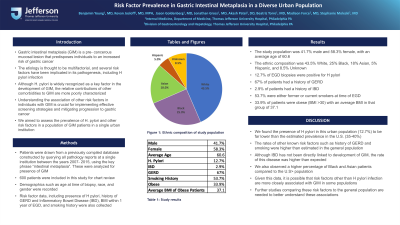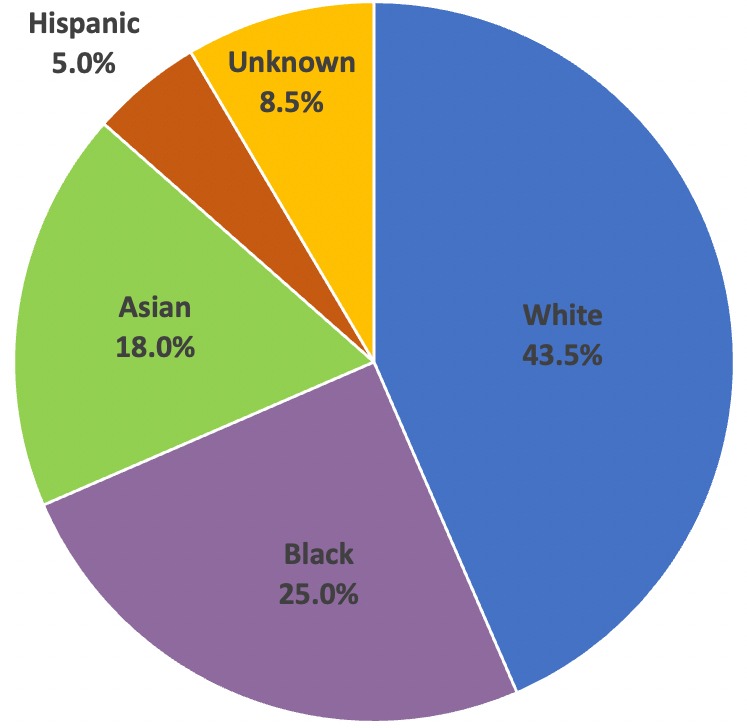Tuesday Poster Session
Category: Stomach
P5048 - Risk Factor Prevalence in Gastric Intestinal Metaplasia in a Diverse Urban Population
Tuesday, October 29, 2024
10:30 AM - 4:00 PM ET
Location: Exhibit Hall E

Has Audio

Benjamin Young, MD
Thomas Jefferson University Hospital
Philadelphia, PA
Presenting Author(s)
Benjamin Young, MD1, Kevan Josloff, MD, MPH1, Jason Goldenberg, MD1, Jonathan Gross, MD, JD2, Akash Patel, DO1, Beatriz Torre, MD3, Madison Force, MD1, Stephanie M. Moleski, MD1
1Thomas Jefferson University Hospital, Philadelphia, PA; 2University of Miami Miller School of Medicine at Jackson Memorial Hospital, Miami, FL; 3Thomas Jefferson University, Philadelphia, PA
Introduction: Gastric intestinal metaplasia (GIM) is a pre-cancerous mucosal lesion that predisposes individuals to an increased risk of gastric cancer. The etiology is thought to be multifactorial, and several risk factors have been implicated in its pathogenesis, including H pylori infection. Although H. Pylori is widely recognized as a key factor in the development of GIM, the relative contributions of other comorbidities to GIM are more poorly characterized. Understanding the association of other risk factors in individuals with GIM is crucial for implementing effective screening strategies and mitigating progression to gastric cancer. We aimed to assess the prevalence of H. pylori and other risk factors in a population of GIM patients in a single urban institution.
Methods: Patients were drawn from a previously compiled database constructed by querying all pathology reports at a single institution between the years 2007-2015, using the key phrase “intestinal metaplasia”. These were analyzed for presence of GIM. 600 patients were included in this study. Demographics such as age at time of biopsy, race, and gender were recorded. Risk factor data, including presence of H pylori, history of GERD and Inflammatory Bowel Disease (IBD), BMI within 1 year of EGD, and smoking history was also collected.
Results: The study population was 41.7% male and 58.3% female, with an average age of 60.6. The ethnic composition was 43.5% White, 25% Black, 18% Asian, 5% Hispanic, and 8.5% Unknown. 12.7% of EGD biopsies were positive for H pylori. 67% of patients had a history of GERD. 2.9% of patients had a history of IBD. 53.7% were either former or current smokers at time of EGD. 33.9% of patients were obese (BMI >30) with an average BMI in that group of 37.1.
Discussion: We found the presence of H pylori in this urban population (12.7%) to be far lower than the estimated prevalence in the U.S. (35-40%). The rates of other known risk factors such as history of GERD and smoking were higher than estimated in the general population. Although IBD has not been directly linked to development of GIM, the rate of this disease was higher than expected. We also observed a higher percentage of Black and Asian patients compared to the U.S. population. Given this data, it is possible that risk factors other than H pylori infection are more closely associated with GIM in some populations. Further studies comparing these risk factors to the general population are needed to better understand these associations.

Note: The table for this abstract can be viewed in the ePoster Gallery section of the ACG 2024 ePoster Site or in The American Journal of Gastroenterology's abstract supplement issue, both of which will be available starting October 27, 2024.
Disclosures:
Benjamin Young, MD1, Kevan Josloff, MD, MPH1, Jason Goldenberg, MD1, Jonathan Gross, MD, JD2, Akash Patel, DO1, Beatriz Torre, MD3, Madison Force, MD1, Stephanie M. Moleski, MD1. P5048 - Risk Factor Prevalence in Gastric Intestinal Metaplasia in a Diverse Urban Population, ACG 2024 Annual Scientific Meeting Abstracts. Philadelphia, PA: American College of Gastroenterology.
1Thomas Jefferson University Hospital, Philadelphia, PA; 2University of Miami Miller School of Medicine at Jackson Memorial Hospital, Miami, FL; 3Thomas Jefferson University, Philadelphia, PA
Introduction: Gastric intestinal metaplasia (GIM) is a pre-cancerous mucosal lesion that predisposes individuals to an increased risk of gastric cancer. The etiology is thought to be multifactorial, and several risk factors have been implicated in its pathogenesis, including H pylori infection. Although H. Pylori is widely recognized as a key factor in the development of GIM, the relative contributions of other comorbidities to GIM are more poorly characterized. Understanding the association of other risk factors in individuals with GIM is crucial for implementing effective screening strategies and mitigating progression to gastric cancer. We aimed to assess the prevalence of H. pylori and other risk factors in a population of GIM patients in a single urban institution.
Methods: Patients were drawn from a previously compiled database constructed by querying all pathology reports at a single institution between the years 2007-2015, using the key phrase “intestinal metaplasia”. These were analyzed for presence of GIM. 600 patients were included in this study. Demographics such as age at time of biopsy, race, and gender were recorded. Risk factor data, including presence of H pylori, history of GERD and Inflammatory Bowel Disease (IBD), BMI within 1 year of EGD, and smoking history was also collected.
Results: The study population was 41.7% male and 58.3% female, with an average age of 60.6. The ethnic composition was 43.5% White, 25% Black, 18% Asian, 5% Hispanic, and 8.5% Unknown. 12.7% of EGD biopsies were positive for H pylori. 67% of patients had a history of GERD. 2.9% of patients had a history of IBD. 53.7% were either former or current smokers at time of EGD. 33.9% of patients were obese (BMI >30) with an average BMI in that group of 37.1.
Discussion: We found the presence of H pylori in this urban population (12.7%) to be far lower than the estimated prevalence in the U.S. (35-40%). The rates of other known risk factors such as history of GERD and smoking were higher than estimated in the general population. Although IBD has not been directly linked to development of GIM, the rate of this disease was higher than expected. We also observed a higher percentage of Black and Asian patients compared to the U.S. population. Given this data, it is possible that risk factors other than H pylori infection are more closely associated with GIM in some populations. Further studies comparing these risk factors to the general population are needed to better understand these associations.

Figure: Figure 1: Ethnic composition of study population
Note: The table for this abstract can be viewed in the ePoster Gallery section of the ACG 2024 ePoster Site or in The American Journal of Gastroenterology's abstract supplement issue, both of which will be available starting October 27, 2024.
Disclosures:
Benjamin Young indicated no relevant financial relationships.
Kevan Josloff indicated no relevant financial relationships.
Jason Goldenberg indicated no relevant financial relationships.
Jonathan Gross indicated no relevant financial relationships.
Akash Patel indicated no relevant financial relationships.
Beatriz Torre indicated no relevant financial relationships.
Madison Force indicated no relevant financial relationships.
Stephanie Moleski indicated no relevant financial relationships.
Benjamin Young, MD1, Kevan Josloff, MD, MPH1, Jason Goldenberg, MD1, Jonathan Gross, MD, JD2, Akash Patel, DO1, Beatriz Torre, MD3, Madison Force, MD1, Stephanie M. Moleski, MD1. P5048 - Risk Factor Prevalence in Gastric Intestinal Metaplasia in a Diverse Urban Population, ACG 2024 Annual Scientific Meeting Abstracts. Philadelphia, PA: American College of Gastroenterology.
